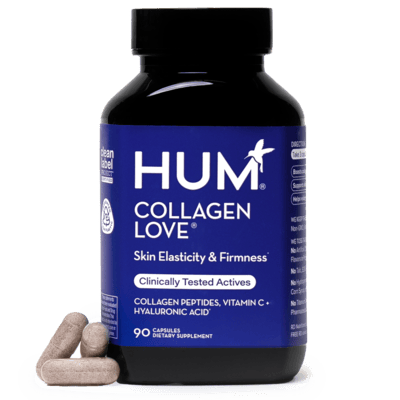Harder, better, faster, stronger. It’s not just a Daft Punk lyric anymore, but practically the mantra of peptide devotees across wellness, fitness, and biohacking circles. From beauty to longevity to recovery, peptides are suddenly everywhere. Depending on specific ones at hand, they’re said to improve everything from weight loss and muscle gain to skin health and libido (and seemingly any and every wellness goal under the sun).
The peptide landscape can seem miraculous at first glance—but it’s also murky once you dive below the surface. That said, it’s important to get the facts and figures straight instead of relying on hype from influencers or strangers online.
Keep reading for a starter guide to peptides—including what they are exactly and which ones are currently dominating the conversation. Plus, if it’s actually possible to dabble in peptide therapy safely.
What Are Peptides?
Simply put, peptides are short chains of amino acids. (Amino acids are the same substances that make up the building blocks of protein, which have longer chains.) Peptides are naturally occurring in the body, and we produce a vast amount of them daily.
“They act like tiny messengers, sending instructions to your cells, and each one has a specific role,” says Zaid Fadul, MD, FS, FAAFP, CEO and concierge physician at Bespoke Concierge MD. Peptides act like cellular to-do lists, regulating everything from tissue repair and inflammation to hormone production and immune defense. “Because peptides are made from the same amino acids found in your body, they often work in harmony with your natural systems,” Dr. Fadul adds. (Many proponents of peptide therapy note this distinction makes them inherently safe, though we’ll get to this point soon enough.)
According to Candice Stewart, DNP, doctor of nursing practice and owner and injector at Stella Capri Wellness, peptides are among the latest and greatest therapies in the biohacking space right now. More people are shifting from reaction to proactivity, thus opting for interventions that can promote health, well-being, and quality of life before major issues arise.
4 Trending Peptides
Dozens of peptide-based drugs have been approved by the Food and Drug Administration (FDA), and more than 650 others are currently in clinical development.
While the landscape is vast and diverse, you’re likely already familiar with a few peptides. Stewart notes that insulin, which controls blood sugar in people with diabetes, was the first isolated peptide invented in 1921. There’s also the wave of GLP-1 agonists—including semaglutide (Ozempic) and tirzepatide (Mounjaro)—which are peptides with FDA approval, too.
GLP-1 meds aside, here are four of the buzziest peptides right now.
1. BPC-157 (Body Protection Compound-157)
BPC-157 is a synthetic compound that’s being touted for its potential healing properties. “Animal research shows it may help repair tendons, ligaments, and muscles, and protect the stomach lining by promoting blood vessel growth and reducing inflammation,” says Dr. Fadul. “It appears to activate pathways that encourage tissue recovery and new blood vessel formation.”
Per Stewart, BPC-157 is most beneficial to heal the digestive tract while also being neuroprotective and cardioprotective.
These points considered, Dr. Fadul says that clinical research in humans is extremely limited. There are also conflicting findings to date. “Some researchers are concerned that because it activates pathways involved in both tissue growth and cell migration, it could theoretically support cancer cell activity,” he shares. “However, other studies show BPC-157 may have the opposite effect: reducing inflammatory markers linked to tumor growth.” In addition, BPC-157 has no approved indication by the FDA; instead, it’s classified under “Certain Bulk Drug Substances for Use in Compounding that May Present Significant Safety Risks.” (The FDA has also issued warnings noting that BPC-157 cannot legally be marketed or compounded for human use.)
Despite conflicting evidence and a lack of FDA approval, BPC-157 is anecdotally touted as a miracle worker. (Even with his concerns, Dr. Fadul shares that he has patients swear by the effects—including an older doctor who says BPC-157 helped him recover quickly from a severe tendon rupture.)
BPC-157 is usually administered as a subcutaneous or intramuscular injection. These routes are considered to be superior to oral supplementation since it has a smaller chance of surviving stomach acids.
2. TB-500 (Thymosin Beta-4)
TB-500 is a synthetic fragment of the naturally occurring protein thymosin beta-4. It’s said to help cells move and regenerate by supporting actin formation, which is a critical part of wound healing and tissue repair, says Dr. Fadul. “Animal studies suggest potential benefits for healing, reducing inflammation, and improving flexibility. However, human research is almost nonexistent,” he continues, on top of it lacking FDA approval.
He adds that there’s caution about possible immune or hormonal side effects, as well as concern about unregulated manufacturing.
TB-500 is administered as an injection under the skin.
3. KPV
KPV is a tripeptide, meaning it consists of three amino acids (lysine, proline, and valine). Per Dr. Fadul, it’s a natural offshoot of alpha-MSH, an anti-inflammatory hormone. “KPV is recognized for its ability to reduce inflammation, support the immune system, and decrease proinflammatory cytokine secretion,” says Stewart. She adds that KPV offers benefits for skin health and wound healing, as well as the potential to alleviate symptoms of inflammatory bowel diseases (IBD).
However, it’s worth noting that positive study results have been demonstrated in animals and lab cells rather than humans. “No human safety data exist, and the FDA has not authorized it for human use,” Dr. Fadul shares. KPV is mostly considered experimental at this point, and it’s sometimes labeled as “for research only” to bypass legal issues.
Those who choose to take KPV can opt for injections, oral supplementation, or even topical application.
4. MOTS-c
MOTS-c is produced naturally within our mitochondria (aka the cell’s generators of energy). “It influences metabolism, insulin sensitivity, and how your body converts food into energy,” says Dr. Fadul.
Compared to the other peptides on this list, it has the most promising research to date. Per Dr. Fadul, early research in animals and limited human trials link MOTS-c to:
- Better metabolic health
- Improved energy
- Enhanced exercise performance
- Regulated blood sugar
- Support for heart and metabolic function
According to Stewart, additional benefits may include:
- Improved insulin sensitivity
- Higher fat burning
- Reduced neuroinflammation
- Help with osteoporosis
- Increased longevity
While MOTS-c isn’t FDA approved, Dr. Fadul says it’s currently under a Phase 1 trial to assess safety and efficacious doses in humans.
MOTS-c is administered via injections under the skin, as oral supplementation wouldn’t survive digestion.
Is It Safe to Take Peptides?
The peptide landscape is still pretty much the Wild West, but that hasn’t stopped people from ordering stacks and syringes online.
Above all, it’s important to approach the landscape with caution. “None of these peptides—BPC-157, TB-500, KPV, or MOTS-c—are approved by the FDA for any medical use,” says Dr. Fadul. “They haven’t gone through the testing required to prove safety, quality, and effectiveness.” In many cases, you don’t know exactly what you’re getting—impurities, mislabeling, or inconsistent dosages—namely when you go the DIY route.
Dr. Fadul adds that most studies use non-human subjects; hence, their side effects and long-term effects in humans are unclear. “Some peptides may cause immune reactions, hormonal shifts, or if impure, serious infections,” he continues. “Theories about cancer risk remain unproven, but given the peptides’ cell-growth effects, careful monitoring is essential.” Individuals who are pregnant or breastfeeding, as well as anyone with a history of cancer, should be particularly cautious.
Stewart—who earned a master peptide certification and has been using peptides in her practice for the past decade—agrees that safety remains a chief concern. However, she gives the green light to those who consult a medical professional who’s studied peptides, works with reputable pharmacies, and knows how to create a bespoke peptide regimen with correct dosing. She believes that peptides can help people stay healthier longer and address a broad range of issues. She reports that she’s helped people with problems as diverse as long COVID and mold toxicity to obesity and sports injuries—anecdotally, with few negative side effects.
The Bottom Line
All things considered, peptides may be helpful—even life-changing, as you’ll likely hear anecdotally or by evangelists online. However, their ability to stay out of harm’s way has yet to be determined in clinical research and governing bodies. There’s a gamble in trying them out for yourself, even if peptides stem from compounds your body naturally recognizes. (The risk is much greater if you go it alone and buy your peptides from suspect sources and proceed without medical supervision.)
“Peptide therapy should never be one size fits all,” Dr. Fadul concludes. “It requires close medical supervision, follow-up testing, and continuous adjustment as your body responds.”

Microdosing GLP-1s: The New Frontier in Weight Management and Metabolic Health?

The Great GLP-1 Plateau: Why You’ve Stopped Losing Weight and What to Do About It

GLP-1 + Lifestyle: The Powerful Duo No One’s Talking About for Long-Term Weight Success






